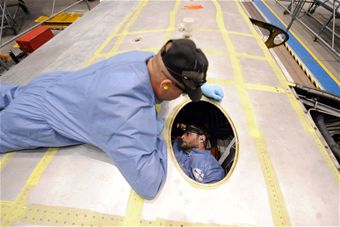Well all want that Manager title. Here's how to do it.
We get asked “How do I become Manager Material?” a lot.
The question you’re really asking is “How can I be first in line when a manager’s position comes up?”.
We want to reframe the question like this “What are upper management looking for in a potential manager – so I can get busy acquiring those skills”.
Management
Fact 1: They are not interested in your people-management skills.
Fact 2: They are not interested in your leadership skills.

Controversial… we know.
We want to break down a simple framework, designed by one of Aviation’s old authorities. It shows you how to look at your career path to the supervisor or manager level. These are things that you can develop, right now, to show upper management – or another company – that you are ready for a managerial role.
So come with us through the four elements of effective leaders, so you can perform a self-audit to see if you are doing enough to guarantee that next step. The Management role.
The "KSA+E" Career Story
KSA+E Stands for Knowledge. Skills. Attitude and Experience.
These are the four critical areas, in that order. And as we dive deeper into each one, I want you to reflect on where you might be on your own path. Or education. And how you can reach “backwards” or “forwards” into these categories to complete your picture.
There’s an added benefit thrown in. The “story” you uncover will reflect how interviewers and employers will perceive you. These 4 elements are how you are being evaluated to determine if your story matches the KSA+E story.
Intrigued? Good. Let’s get to it.
A leader is a Competency Story
You are. Whether you like it or not. Your journey is a four-part story about the things that you are competent at. As a person and as a potential manager or leader.
And competency is a key word, a word you should invite into your life and hold dear. This word does not mean success, nor does it mean failure. Most importantly, it shows us that you have seen both and you have embraced the good and expelled the bad to become proficient in your role.
A true leader is proven to be Competent
You can acquire knowledge or become skillful and thus show competency. If you have human resource experience or you are getting advice on your Resume (that’s a CV if you live in Europe) they ask you to write down your achievements. And not your responsibility.
Why do they do this?
because they want to hear about how you implement sales strategy, or improved time management or secured 20% ROI on an aircraft delivered to Delta during the pandemic. No one cares how you are “responsible” for sales in North America, or how you manage a team of three people.
They ask for your career “stories” because the KSA+E are all contained in each one. How was your actual performance? They want to know you are already fit for management.

Degrees & Education
Yes, these are degrees, diplomas, Certificates, and other academic courses. These are important, especially as they relate to your current role and competency. You can acquire these early in your life, or later.
But hopefully these are ongoing and continuous, especially for the softer skills. We always recommend that you identify your strengths early in your career. We are huge proponents of psychometric or enneagram testing. To identify areas where you excel or where you need work.
If you are in a good school or college, these are already areas where you will have been exposed to. They don’t tell you where you will go, only where your efforts should go based to secure your professional desires.
Whether you are in engineering, Flight Attendant, baggage handler or Air Traffic controller, you should seek out courses that turn your strengths into Super Strengths.
When you think of yourself you should be able to list Three things that are your super strengths. Areas of your life or work where you have natural ability and are extremely competent as a person.

The Growth Mindset
It’s one thing to learn something. In a classroom or remotely or by reading. It’s another to take this knowledge and apply it in the real world. When you do, it becomes a skill.
You can teach marketing to anyone, but not everyone will go on to sell successfully. Medical students should not (and do not) be put in front of patients. They have super strengths in some areas and weaknesses in others. Like all of us.
Some aircraft engineers gravitate towards design and creativity. Others just want to climb inside a B747 fuel tank and take it apart. This is completely natural, and you should always be true to who you are.
Your story and your competencies are a process. They should be clear in your mind so when you are asked about them or you can write about them in Resume. You will do them justice and you will speak passionately and articulately about them. Your competence will be in full show.
The Manager Attitude
This is by far the most challenging and difficult to nail down. Seeing a person in an interview once, twice, or even three times is never enough. Its why personality tests have become so popular. HR people cannot (and should be expected to) be mind-readers or empaths.
Able to predict the behavior or relationship of people months or years into the future. That’s why your competency story is so valuable. What is most important to them is that past behavior.
This is the best indicator of future behavior. And by behavior what we mean of course is competency. Competency is what gets you closest to a management position. Not a degree and not leadership.

Manager Behavior
Able to predict the behavior or relationship of people months or years into the future. That’s why your competency story is so valuable. What is most important to them is that past behavior. This is the best indicator of future behavior.
And by behavior what we mean of course is competency. Competency is what gets you closest to a management position. Not a degree and not leadership.
If you are not yet a manager, then this is where you can make the most gains. Employers are not expecting you to show managerial skills or boss-like behavior. What they want to see is you being respectful (upwards and downwards), sharing your competencies with others, either through helping them or advising them. And reflecting the company’s values in your own values.
You see how these have nothing to do with managerial type things or leadership? This is your application of your skills, gained from knowledge, through your behavior towards your peers.
KSA. Yes, you can do a manager’s course and you can learn about leadership and communication skills – that’s all fine. At least then you will see how there are hundreds of theories on leadership styles and theories. But only if it builds upon the process you already have developed into your super-strength.
Remember your story is your journey. When people see that you become the most powerful element in any company.
E is for (Manager) Experience
This is the secret sauce. If you are KSA’d out of your mind, then you are applying your super strength in the real world. Repeatedly. That’s what we want.
The best kinds of people (and first-time manager) need to be challenged repeatedly. It’s what keeps them fresh. There was a time, years ago, when 10-15 years at a company was normal and expected.
Not anymore. Managers can move every 1 or 2 years. Now a caveat here, this only applies to those competent people who are in the KSA+E super-strength category.
Why? The reason is that the company has not lived up to their part of the deal. And not the other way around. You see the difference? The key element is honesty with oneself.
You can waltz into any role with the KSA+E method. And if they don’t satisfy your goals and objectives. Waltz back out.




